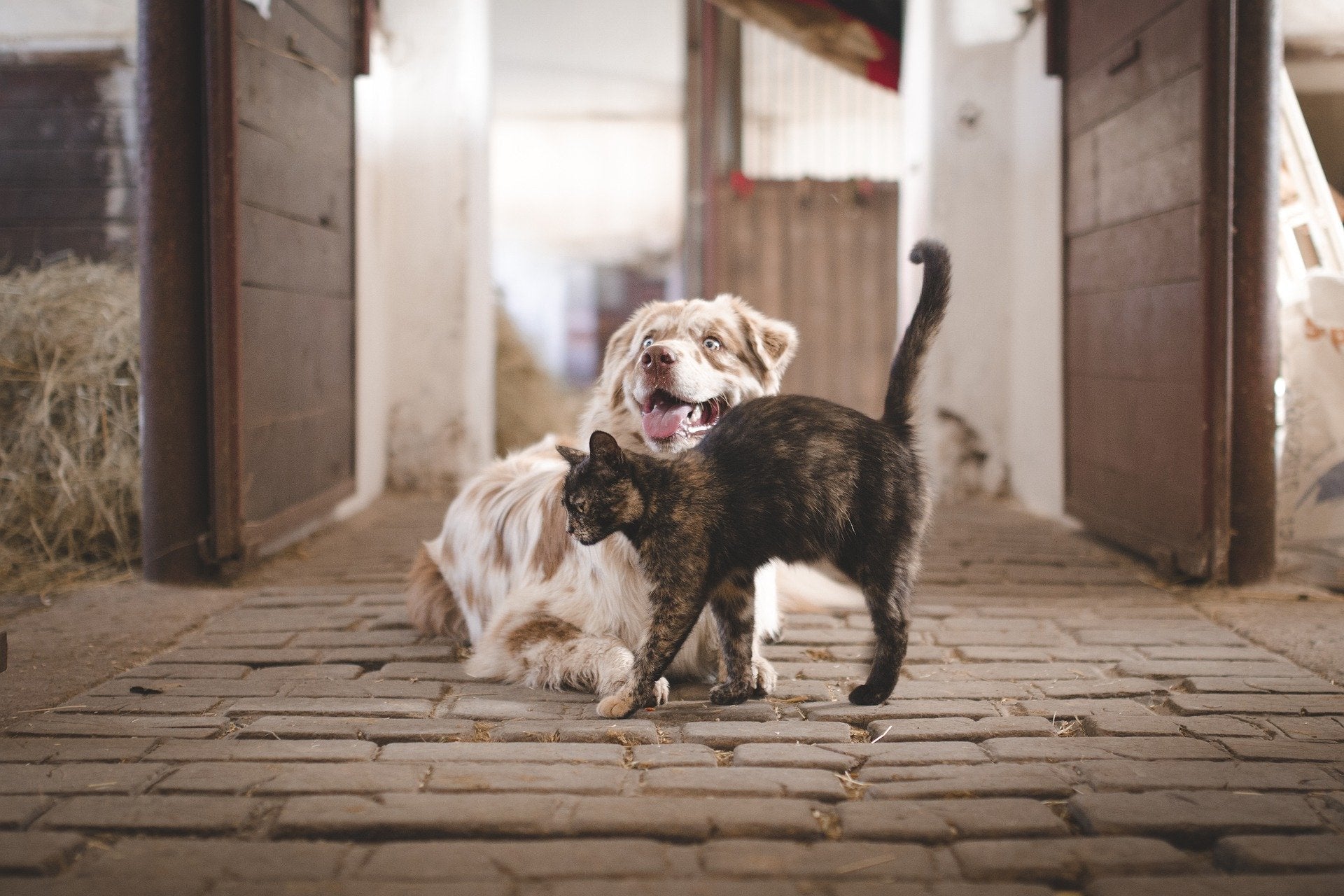Metabolism is defined by the chemical processes that occur in living cells, where energy is provided for vital processes needed to maintain life. Many factors can affect the resting metabolic rate of animals, including genetics, breed, age, and body size. However, as an animal ages, resting metabolic rate decreases, which may affect the healthy weight levels of your pet. Supporting a healthy metabolism for your pet is one facet to maintaining healthy weight.

How Can I Tell if My Pet Is Overweight?
First, it's important to determine if your pet is overweight. The easiest way to do this is by checking their body condition score. Body condition scoring is a system developed by veterinarians to help you assess your pet's weight at home.
Check out this article from Vets4Pets to find out how your pet scores. If your pet is overweight, here are 5 quick tips to boost their metabolism and help them safely lose weight:
1) Add Probiotics to Their Diet
Probiotics are beneficial bacteria that are found in supplements and fermented foods. They work with the good bacteria already present in your pet's gut to break down and digest food.
Probiotics help maintain healthy levels of good bacteria in the gut. They have an important role to play in keeping your pet's digestive system running smoothly, boosting the immune system, and supporting overall health.
Probiotics are also thought to aid weight loss and prevent obesity in pets by helping regulate gut health. Studies have shown that there is a direct correlation between the gut health of animals and their ability to lose weight. This suggests that gut bacteria play a powerful role in weight regulation.
Feeding your pet fermented foods is a great way to add probiotics to their diet. Some of the healthiest and most beneficial probiotic foods include kimchi and other fermented vegetables, as well as fermented beverages like kefir and kombucha.
2) Add Coconut Fiber to Their Diet
Dietary fiber is essential for keeping your pet's digestive tract functioning normally. Specifically, raw, unprocessed coconut fiber has anti-inflammatory properties because of its medium-chain fatty acids (MCFAs). When fermented, coconut fiber produces short chain fatty acids (SCFAs) in the gut, which acts as prebiotics to feed gut microbiota.
As an added bonus, dietary fiber can help your pet maintain a healthy weight. Calories provided by fiber are very different from a nutritional standpoint than those provided by regular carbohydrates or protein, and they’re treated differently by dieticians and weight loss experts.
Coconut fiber aids in digestion, and actually uses energy when it comes to breaking down and processing its dense structure. That's why people who are dieting are often encouraged to eat high-fiber foods in order to actually "subtract" calories from their daily totals.
In addition, fiber adds bulk to your pet's food without adding excess calories. This results in a longer lasting feeling of satiety, decreasing the likelihood of overeating and weight gain. Not all coconut fiber is the same - make sure you give a raw, unprocessed coconut fiber like CocoTherapy’s Organic Coconut Chips, which is easily assimilated and broken down by your pet’s digestive system.
3) Give Them Fish Oil
Fish oil is a long-chain fatty acid, composed of a chain of 18 carbon atoms. It is an omega-3 polyunsaturated fat composed of essential fatty acids, eicosapentaenoic acid (EPA) and docosahexaenoic acid (DHA). These essential fatty acids are found in cold water fish such as mackerel, salmon, and tuna.
The omega-3 fatty acids in fish oil have anti-inflammatory properties and may help protect against heart disease and cancer. They also improve brain function, support eye health, help reduce allergies, and protect against inflammatory conditions like osteoarthritis.
But that's not all. New research has shown that fish oil may also help pets maintain a healthy weight. According to PetMD, "we have known for a long time that omega-3 fatty acids DHA and EPA reduce inflammation. These fatty acids also reduce the effect of the inflammatory enzymes produced by body fat. New is the fact that omega-3 fatty acid supplementation may also help to promote weight loss."
4) Feed Them Coconut Oil*
Despite the fact that it's a saturated fat, adding coconut oil to your pet's diet can help speed up their metabolism and aid weight loss. Fat is an essential part of a healthy diet. Virtually all natural foods contain some fat, and it's used by the body as a major source of energy. Medium chain fats found in coconut oil have been shown to increase the metabolism compared to long chain fats found in butter.

Coconut oil is considered a “thermogenic oil”, where it may actually boost a sluggish metabolism. The MCTs in coconut oil provide a quick and easy source of energy for the body. This helps boost metabolism and aids in weight management. In his book, Coconut Therapy for Pets, Dr. Bruce Fife, C.N., N.D., explains:
"After eating coconut oil, you (and your pet) get a boost of energy. This energy lift actually stimulates metabolism, kicking metabolism up into a higher gear. This effect lasts for a full 24 hours. During this time the body's engines are burning at a higher rate, so more calories are being burned off. At the end of the day, fewer calories are available to be stored as fat. Therefore, if excess calories are not consumed (i.e., not overeating), you and your pet can experience weight loss."
When giving coconut oil to your pets, choose a raw, true-cold pressed, unprocessed organic virgin coconut oil with high levels of medium chain fatty acids.
5) “Zoomies” is Good - Keep Them Moving!
Have you seen your dog or cat suddenly get a spurt of energy and start racing around (we call this “zoomies”) for seemingly no apparent reason? This quick burst of intense activity is a good thing and can be likened to high-intensity interval activity or exercise for humans. Short, intense bursts of activity have been shown to burn more body fat by increasing the metabolic rate, compared to long, steady exercise (such as long walks or strolls in the park).
Encourage your dog or cat to zoom around by tossing a ball or an irresistible toy. A quick game of tug-of-war can get your dog moving. Stimulate your cat with dangly toys on a string or a laser pointer to encourage intense bursts of activity. Mixing up their exercise routine with a few high-intensity activities can keep them lean, improve muscle tone, and increase their metabolic rate. As an added bonus, these stimulating activities can help reduce stress, where research has shown that long-term stress may wreak havoc on metabolism, increase inflammation, and cause stress-induced weight gain.
The Bottom Line
Leaner pets live longer, healthier lives. Incorporating these tips and making small changes in your pet’s (and your) daily routine can help you and your pet maintain a healthy metabolism. A healthy metabolism can help your pet lose added weight, keep it off, increase energy, and be healthier overall.



